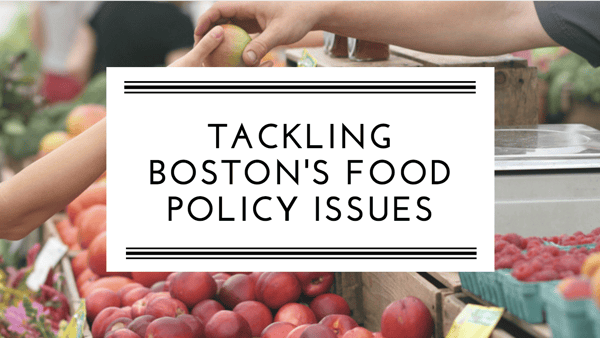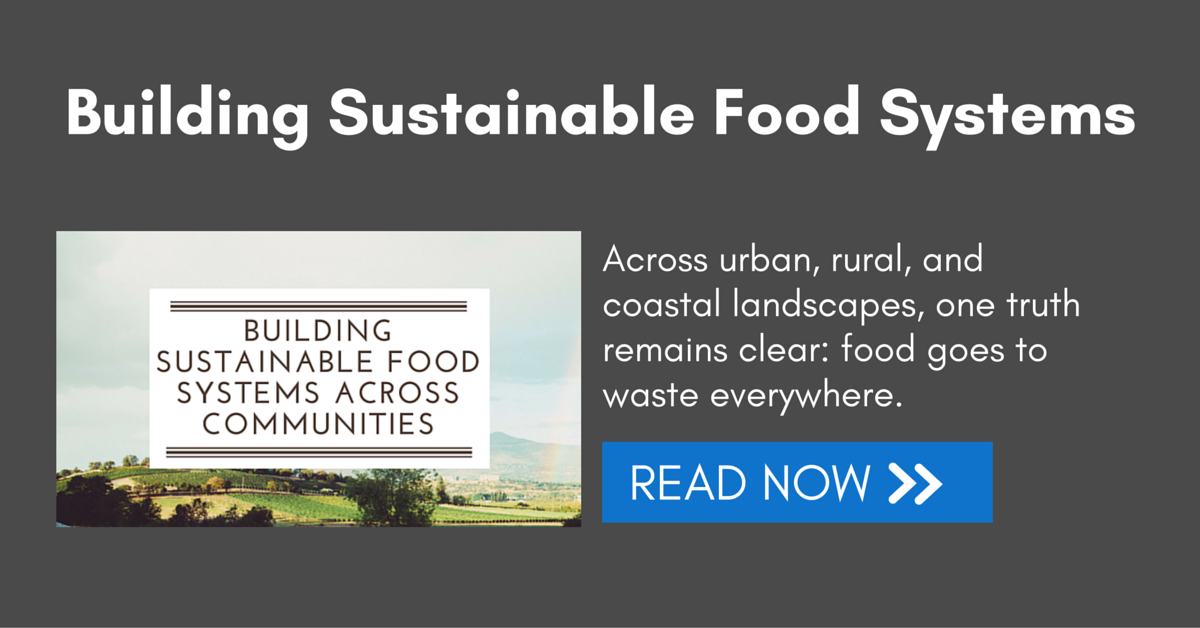
Last month, the Boston Food Policy Council and Mayor’s Office of Food Initiatives convened a meeting of various city stakeholders around the topic of “Tackling Boston Area Food Policy Issues”.
The session, facilitated by the Harvard Food Law & Policy Clinic (HFLPC), shaped discussion around eight topics of local and national food policy:
- Food System Infrastructure
- Consumer Access
- Consumer Demand
- School Food and Education
- Land Use Planning
- Farm to Institution
- Food Safety and Processing
- Food Waste
Boston's Food Policy
The meeting brought together a unique set of perspectives from government, institutions, academia, and the non-profit arena, with a few representatives from the private sector (though largely from non-food companies).
Given Spoiler Alert’s interest in wasted food and the state’s efforts to divert organic waste from landfills (the subject of a previous blogpost), we were particularly interested in the “Food Waste” discussion. We appreciated HFLPC’s highlights on urban initiatives to tackle this problem - particularly in San Francisco and Seattle.
Following the meeting, we sat down with Emily Broad-Leib and Alli Condra (HFLPC Director and Senior Clinical Fellow, respectively) to get their thoughts on Boston food policy.
Q & A with Harvard Food Law & Policy Clinic
Spoiler Alert: Which of the 8 areas do you find most interesting and/or unique to Boston?
HFLPC: Because we are talking about a food system, the eight areas we discussed are all connected such that addressing one area will have implications and ramifications in other areas. With that said, we think that urban agriculture and mobile vending are the most interesting and unique things happening in the food space in Boston.
First, Boston has been a leader in deliberately using policy-making to encourage the development of urban agriculture within the city. By spending a couple years meeting with community members and securing buy-in from a variety of stakeholders, Boston has increased the likelihood that urban agriculture will be a success.
The process of creating and passing Article 89 (an urban agriculture re-zoning initiative) intended to address other issues within the food system – primarily increasing economic and geographic access to healthy food for low-access communities. Urban agriculture in Boston will also provide economic opportunities for a wider range of Boston residents and potentially increase the amount local food served in local institutions (e.g., schools, restaurants, agencies).
Mobile vending is also an exciting opportunity for Boston. Within the past few years, Boston has seen a tremendous increase in the number of food trucks. As with urban agriculture, the city has focused on helping food trucks succeed; to this end, we worked with the Mayor’s Office of Food Initiatives to create a guide walking aspiring food truck entrepreneurs through the permitting and approval processes. Beyond food trucks, Boston can use other forms of mobile vending to increase access to healthy food for Bostonians. For example, Boston could expand its permitting system to allow for mobile produce carts (like they do in New York City).
Spoiler Alert: What were some of your main takeaways from the dialogue in the room?
HFLPC: One of the biggest takeaways is that there is already so much happening in the food space in Boston. For example, the Mayor’s Office of Food Initiatives made great strides in coordinating the various food efforts happening across City Hall and implementing new policies to strengthen the food system (e.g., urban agriculture, food trucks, and Bounty Bucks).
And there are numerous organizations across the city and state whose work in communities is making a meaningful impact on the food system. Although these organizations work together in some ways, the impact that could be made by increased coordination of efforts and an attention to common policy goals and challenges could be impressive.
From the breakout group discussion we saw that the nine groups identified common challenges and goals. Finding this common ground and mobilizing around priority issues is a great first step in changing policy to improve the food system in Boston.
Spoiler Alert: What is next for the Food Policy Council and Harvard Food Law & Policy Clinic?
HFLPC: We are currently reviewing the policy challenges and goals reported during the breakout session to create a “potential policy agenda” for the Boston Food Policy Council. This document can be used as a foundation for future discussions and priority setting, so that stakeholders can start to refine their policy goals and create an action plan to pursue those policy goals.
We at the Harvard Food Law and Policy Clinic are excited about the energy and enthusiasm displayed at the meeting and have high hopes for what the Boston Food Policy Council can achieve.
We look forward to continuing our work with the Boston Food Policy Council and helping Boston become a bigger leader in food policy.
.png?width=250&name=SpoilerAlert_WhiteLogo_LeftStacked%20(7).png)
